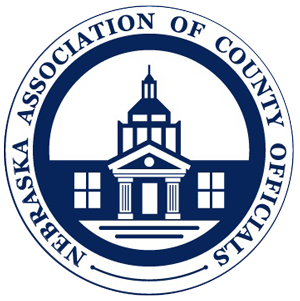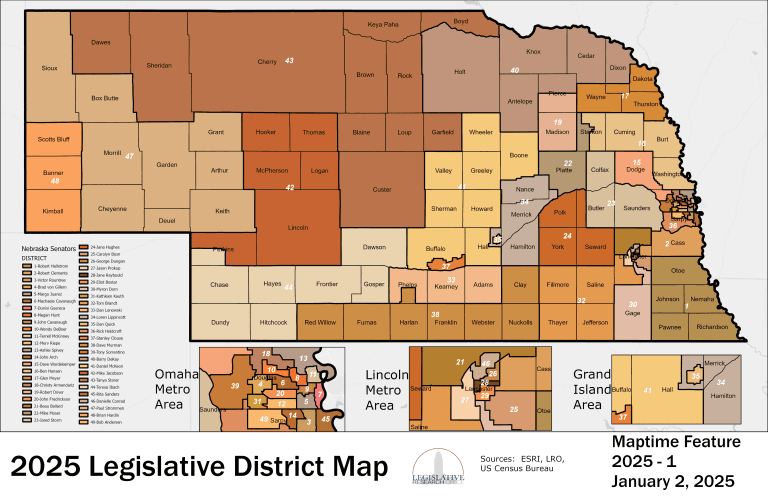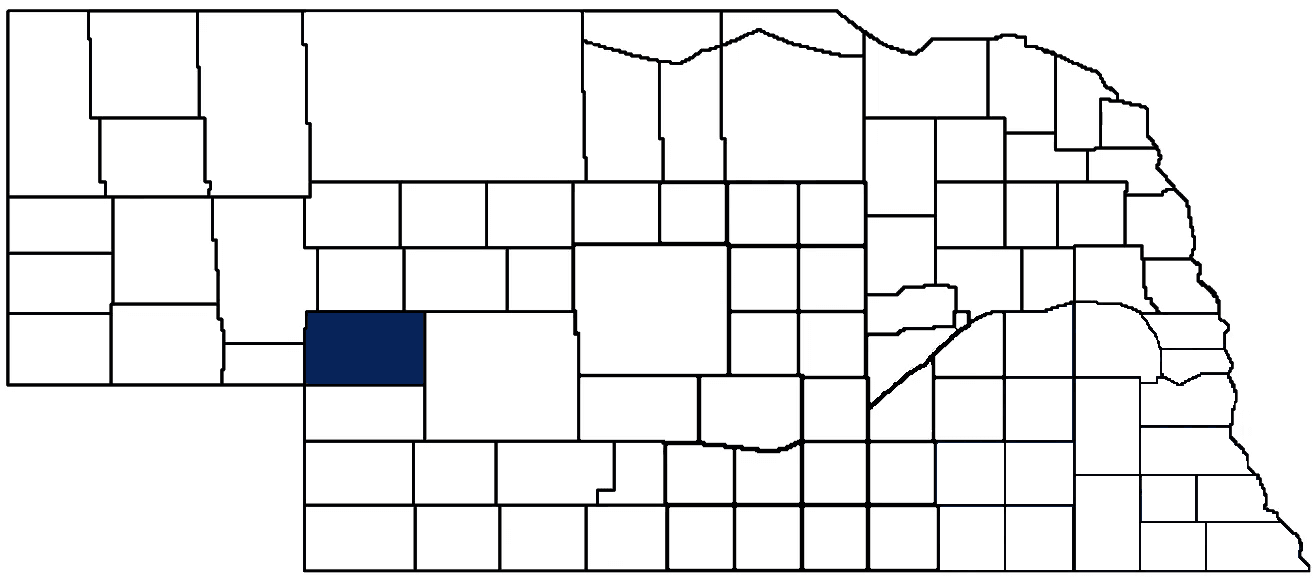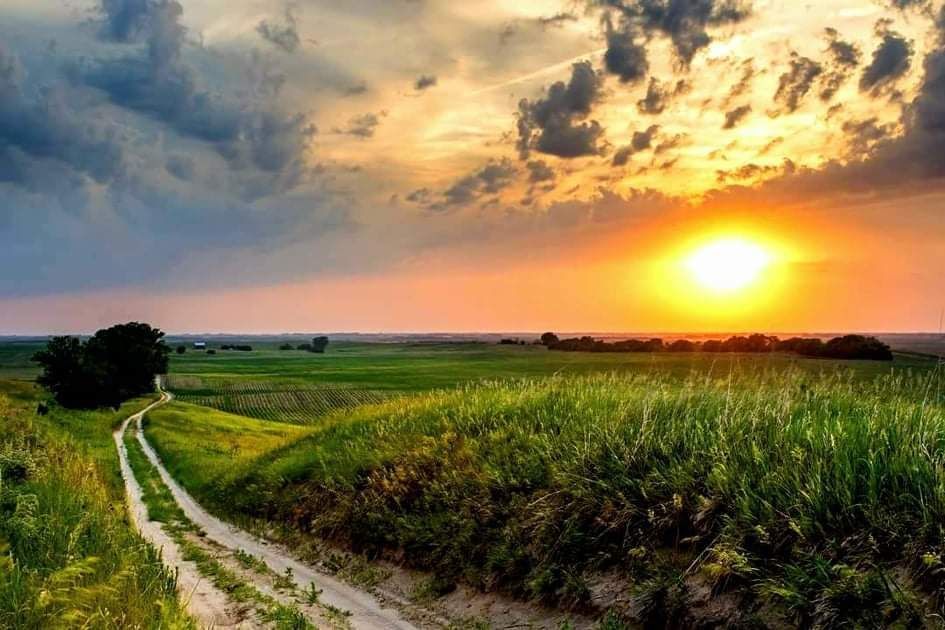- General Info
- Demographics
- Education and Employment
- Valuation and Taxes Levied
- State Senators
- History
- County Programs
- Other Information
Communities and Development
Keith County Seat: Ogallala
Total County Population: 8,335
- Cities (pop. & class): Ogallala (4,878 • 1st Class)
- Villages (pop.): Brule (331), Paxton (516)
- Unincorporated Pop. (% of county pop.): 3,126 (38%) 2020
Land Development (% of total land in county):
- Agriculture: 90%
- By method: Pasture (pure grassland) (58%); Irrigated (row crop/grain/forage) (16%); Dryland (row crop/grain/forage) (16%) • Neb. Dept. of Rev. - total equals agriculture's %
- By commodity: Livestock (private grassland; no conserv. res.) 59%, Corn 19%, Wheat 4%, Soybeans 4%, Alfalfa 1%, Popcorn 1% • USDA - total equals agricultures %
- Residential, Commercial, Industrial, Conservation Reserve & Exempt (combined): 10% 2022
County Offices
Courthouse Address and Hours:
511 North Spruce Street
Ogallala, Nebraska 69153
M-F 8:00 am - 4:00 pm
Complete list of county board members
County Board Meetings: Wednesday
View the County's Government Maps
NACO District: West Central
West Central District Officers
General
Population: 8,335
Land area (sq. mi.): 1,061.74
Population per square mile: 7.9
Race and Age
Race 2020
White: 86.8%
African American: 0.2%
American Indian: 0.2%
Asian: 0.5%
Hispanic: 9.0%
Native Hawaiian and Pacific Islander: 0.1%
Two or More Races: 3.1%
Age 2020
0-17: 21.1%
18-64: 51.8%
65+: 27.1%
Households
Total households: 3,672 2020
With one child: 340 2022
With 2+ children: 480 2022
With seniors (65+): 1,020 2022
Socioeconomics
Median household income: $58,132 2023
% of population in poverty: 11.4% 2023
# of housing units: 5,342 2020
Owner-occupied rate: 73.1% 2020
Median home price: $169,830 Q4 2024
2024 building permits for detached single family homes: 38
2024 building permits for non-detached housing units: 0 (townhouse, duplex, or apt. unit)
Technology
Access to broadband (100 Mbps via fiber or cable modem): 79.8% 2021
Sources: National Association of Realtors, Nebraska Department of Revenue, Nebraska Legislature, Nebraska Library Commission, U.S. Bureau of Economic Analysis, U.S. Census Bureau (building permits), U.S. Census Bureau (demographics), U.S. Census Bureau (municipalities)
Employment, Schools, and Child Care
Unemployment rate: 2.4% March 2025
County Employment Website: https://www.keithcountyne.gov/newslist.php
High school graduate or higher: 90.0% 2020
School Districts: Arthur County Schools, Garden County Schools, Ogallala Public Schools, Paxton Consolidated Schools, Perkins County Schools, South Platte Public Schools
Bachelor's degree or higher: 19.3% 2020
Community College Service Area: Mid-Plains Community College
Countywide child care capacity: 13 providers; 227 children 2024
Find child care: For a list of child care providers in your zip code, visit Nebraska DHHS or the Nebraska Resource and Referral System.
Keith County Economy
Annual Gross Domestic Product (GDP): $536,866,000 2023
Nonfarm Small Business Receipts: $84,443,826 2022
Nonfarm Wage Income: $153,604,000 2022
Farm and Ranch Commodity Sales Receipts: $168,392,000 2022
Farm and Ranch Operations (Non-Sales) Receipts: $13,320,000 2022
- For components of nonfarm small business receipts, nonfarm wage income, and farm & ranch commodity sales and operations receipts, see "Notes" below.
Cattle Producers: 114
- Pastureland Cash Rent (avg.): $18/acre
Crop Producers: 138
- Dryland Cash Rent (avg.): $50/acre
- Irrigated Land Cash Rent (avg.): $220/acre
Grain Elevators by Location (bushels capacity):
- Brule: CHS (3,295,000)
- Ogallala: Kelley Bean (149,000)
- Paxton: The Andersons (1,245,631)
- (1 bushel = 56 lbs. corn/sorghum, 60 lbs. soybeans/wheat; % max. moisture = 18% beans, 15.5% corn, 14% sorghum/soybeans, 13.5% wheat)
Railroad Miles: 170.42 main, 9.17 side
- Places with Railroad Service: Brule, Lemoyne, Ogallala, Roscoe, Ruthon, Paxton
Local Grain Market: Click for today's grain prices in Keith County
Farmers Market: Ogallala Farmers Market (July - October, Saturdays 8 AM - 12 PM)
Electricity Providers: Midwest Electric Member Corp., Nebraska PPD, Wheat Belt PPD
Irrigation and Drinking Water
Rural Irrigation Wells: 1,172 2024
Rural Livestock Wells: 456 2024
Rural Commercial/Industrial Wells: 28 2024
Rural Drinking Water Wells: 742 2024
Drinking Water Utility Connections: 2,354 Residential; 465 Commercial; 12 Industrial 2024
Surface Water Diversions (Irrigation): 59 2024
Click for real time:
Streamflow data on the South Platte River at Roscoe
Notes
Hitchcock County Economy
- Nonfarm small business receipts are reported by partnerships and sole proprietorships. They do not include receipts reported by cooperative associations.
- Nonfarm wage income is reported based upon the wage earner's residential address; therefore, it also includes wages earned by Keith County residents in other counties or states, but it excludes wages earned in Keith County by residents of other counties or states.
- Nonfarm wage income excludes wages earned by anyone claimed as a dependent.
- Farm and ranch commodity sales receipts and operations receipts are reported based upon the farm or ranch owner's principal county of operations; therefore, those figures also include receipts reported by producers operating principally in Keith County for their production in other counties or states, but the figures exclude receipts reported for production in Keith County by producers operating principally in other counties or states.
Irrigation and Drinking Water
- A rural irrigation well is any well intended for irrigating crops that, either on its own or as part of a set of commingled wells, is capable of pumping more than fifty (50) gallons of water per minute (gpm). Note that some rural commercial/industrial wells are also capable of pumping more than 50 gpm. In Nebraska, the owner of any well--or set of commingled wells--that is capable of pumping more than 50 gpm must register the well(s) with the state government and have a permit for the well(s) from the local natural resource district (NRD).
- Rural livestock wells and rural drinking water (also known as "domestic") wells are not allowed to pump more than 50 gpm unless permitted by the local NRD. Each rural drinking water well usually serves one single family home, though in rare cases a rural drinking water well serves multiple homes.
- Data on rural livestock wells and rural drinking water wells may be incomplete for wells drilled prior to September 9, 1993. State law does not require wells drilled prior to that date to be registered with the state government if the wells are not capable of pumping more than 50 gpm. Neb. Rev. Stat. § 46-735; see Laws 1993, LB 131, § 25.
Sources: National Agricultural Statistics Service (USDA), Nebraska Cooperative Council, Nebraska Coordinating Commission for Postsecondary Education, Nebraska Department of Health and Human Services, Nebraska Department of Revenue, Nebraska Department of Transportation, Nebraska Office of the CIO, Nebraska Power Review Board, Nebraska Public Service Commission, U.S. Bureau of Economic Analysis, U.S. Bureau of Labor Statistics, U.S. Census Bureau, U.S. Energy Information Administration, U.S. Department of the Treasury (IRS), Warehouse and Commodity Management Division (USDA)
2024 Levies and Valuation
County levy rate: $0.2217 per $100 of taxable valuation
County property taxes levied: $5,514,717
Total local government property taxes levied: $27,022,796
Total countywide taxable valuation: $2,487,732,370
Click here for all levy rates in Keith County
County Levy and Taxation Laws
Levy limits
Since 1996, counties and other political subdivisions have been subject to the levy limits listed in Neb. Rev. Stat. § 77-3442 and Neb. Rev. Stat. § 77-3443.
Statutes and regulations
Nebraska Revised Statutes (Chapter 77)
Nebraska Administrative Code (Title 350)
Local tax reductions, exemptions, and credits
Neb. Rev. Stat. § 76-902(5)(a) (Deed "stamp tax" exemption): "The [stamp tax] shall not apply to: ... (5)(a) Deeds between spouses, between ex-spouses for the purpose of conveying any rights to property acquired or held during the marriage, or between parent and child, without actual consideration therefor."
Neb. Rev. Stat. § 77-201(2) (Valuation of agricultural land and horticultural land): "Agricultural land and horticultural land as defined in section 77-1359 shall constitute a separate and distinct class of property for purposes of property taxation, shall be subject to taxation, unless expressly exempt from taxation, and shall be valued at seventy-five percent of its actual value, except that for school district taxes levied to pay the principal and interest on bonds that are approved by a vote of the people on or after January 1, 2022, such land shall be valued at fifty percent of its actual value."
Neb. Rev. Stat. § 77-6703(1) (Tax credit for school district taxes paid): "(1) For taxable years beginning or deemed to begin on or after January 1, 2020, under the Internal Revenue Code of 1986, as amended, there shall be allowed to each eligible taxpayer a refundable credit against the income tax imposed by the Nebraska Revenue Act of 1967 or against the franchise tax imposed by sections 77-3801 to 77-3807. The credit shall be equal to the credit percentage for the taxable year, as set by the department under subsection (2) of this section, multiplied by the amount of school district taxes paid by the eligible taxpayer during such taxable year."
Sources: Nebraska Department of Revenue
State Senator: Paul E. Strommen (District 47)
Committees
- Appropriations
- Legislature's Planning Committee
- Homeland Security Policy Group
- Statewide Tourism And Recreational Water Access and Resource Sustainability (LB406)
Map and statistics for Legislative District 47
Map of all districts in the Nebraska Unicameral Legislature
Keith County History
Number of Registered Historic Places: 13
Year Authorized: 1873
Year Organized: 1873
Etymology: M.C. Keith (rancher)
The colorful history of Keith County is the story of how trails, rails, and roads crisscrossed the county, re-creating it each time. The wagon trails to the West came first, most prominently, the Oregon and Mormon trails. While many people passed through the county, others stayed and built homesteads while others saw the trail as an opportunity to become merchants and suppliers. Next, the railroad lines stretched through the middle of Nebraska, connecting the coasts and delivering freight across the Great Plains. The Texas-Ogallala cattle drive trail also cut directly through the heart of Keith County, delivering hundreds of thousands of cattle to various railroad destinations, in particular, Ogalla. Finally, the interstate system witnessed the consolidation of east-west traffic across the county and region in the mid-twentieth century. Each a time a new form of transportation entered Keith County, new industries and communities sprang up.
Originally, Keith County was the territory inhabited by several Native American tribes (most notably, the Sioux, Cheyenne, and Arapahoe) for hundreds of years prior to European settlement. Following the Louisiana Purchase (and the subsequent Lewis and Clark expedition) and the discovery of gold in California in the mid-nineteenth century, settlers began passing through and settling Nebraska territory.
In 1873, the Legislature organized the county, naming it after M.C. Keith, who owned one of the largest ranches in the area; Keith would later become the grandfather of Keith Neville, nicknamed “The Boy Governor” for his young age, who filled the gubernatorial office from 1917-1919. Ogallala, founded in 1868 and renown for being the terminus of innumerable cattle drives, became the county seat. Interestingly, while many other Nebraska cities experienced population booms during the late nineteenth century, Ogallala’s population stagnated around five hundred people until the 1920’s. After that, the population of the city (and overall county) increased by several thousand over the next several decades, which was in contrast to the growth patterns of many other rural counties.
Finally, the story of Keith County is not only the story of trails and roads, but also water—both above and below ground. The North Platte River and Lake McConaughy are the most prominent water features, but the Ogallala Aquifer, spreading below the county (and stretching down to Texas), is the defining feature permitting farming in western Nebraska. In fact, some of the deepest parts of the Ogallala Aquifer are in upper central Nebraska.
Highlight an important program in your county in this space! Send an email to:
Local Highlights
License Plate Number: 68
Time Zone: Mountain
Number of Veterans: 584 2023
Zoned County: Yes
Number of County-Owned Bridges: 30
Election Data
General Election Turnout: 74% 2024
Total Registered Voters: 5,742 2024
Number of Precincts: 9 2022
Number of Election Day Polling Places: 4 2022
Land Area per Polling Place: 265.44 sq. miles
Intergovernmental Data
Emergency Mgt. Planning, Exercise and Training (PET) Region: North Central/Sandhills
Natural Resource District: Twin Platte NRD
State Lands (acres): Lake McConaughy SRA (37,032.77), Lake Ogallala SRA (559), Ogallala Rest Area EB (14.6), Ogallala Rest Area WB (13.2), Ogallala Strip WMA (456.04), Water Research Lab (1,120)
Sources: Nebraska Department of Transportation, Nebraska Emergency Management Agency, Nebraska Game & Parks Commission, Nebraska Legislature, Nebraska Office of the CIO, Nebraska Secretary of State, U.S. Department of Veterans Affairs, U.S. Election Assistance Commission, U.S. National Archives and Records Administration (eCFR)



